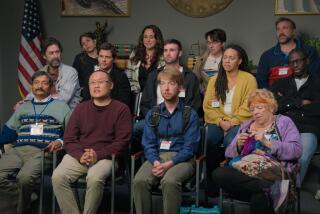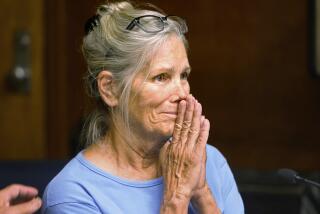PERSPECTIVE ON THE HEIDI FLEISS TRIAL : The Jury Is In on Drugs vs. Sex : The five who admitted ‘misconduct’ made a moral judgment that pandering is a minor offense. Give them credit.
While “Simpson: The TV Show” dominates the airwaves, less-observed history is being made on another floor in the Criminal Courts building in Los Angeles.
The December conviction of Hollywood madame Heidi Fleiss on pandering charges is mired in a flap about how and why the jury reached its decision--a decision that five of 12 jurors sought to repudiate when they saw its consequences: Fleiss, to their horror, would be going to jail.
These jurors weren’t voting on whether she did it. They weren’t even voting for a nice person gone wrong, though they may have found her more attractive than the policemen whose squirrelly sting trapped her. They gave a verdict they thought would free her because they didn’t think what she did was so wrong. In their view, prostitution just didn’t deserve prison time.
According to the forewoman, half the jurors were inclined to acquit from the very outset. But they knew, she said, that they had to go “by the law.” To that end, as they later revealed, they discussed the case outside court, considered sentencing, traded votes and came up with a gamble.
Knowing that they had to acknowledge that Fleiss had definitely done something, they fixed on some guilt here, some innocence there--yes to three counts of pandering, no to one count of selling cocaine, a deadlock on two more counts of pandering. They figured that the drug charge had to be the big one, the pandering no big deal, and were devastated when it turned out the opposite. Fleiss could have gotten probation on the cocaine rap, but there was a mandatory sentence of three to eight-plus years for the pandering.
“That’s way too much,” said the forewoman at the time. “You’ve got kids out on the streets dealing drugs, for crying out loud, and they get probation.” Said another juror, “I don’t think she should go to jail for it.”
So five of them filed statements acknowledging that they’d discussed the case outside court, discussed sentencing, traded votes--misconduct that could invalidate their verdict. (The judge is to rule Friday on whether to grant a new trial). But they’re hardly contrite. Taken to task by lawyers for both sides and by the court for their legal misconduct, they obviously believe that they made the right moral judgment.
Such conviction is a clue to what’s happening here, something that goes beyond Heidi Fleiss. After years of censure going back to the days of Mary Magdalene, a group of randomly chosen representatives of today’s society--five women and seven men--believe that prostitution (and prostitution management, the panderer’s part) is not so terrible. At the very least, it shouldn’t mean doing time.
If this view is widespread, there are some interesting implications to consider.
Any change in the law, of course, must come from the Legislature. But as a legislative priority, the decriminalizing of prostitution is not exactly sweeping the country. Nor is it likely to. Consider the composition of a legislature: California’s is 79% male, not traditionally a group upset that prostitution is defined as a crime, the prostitute a criminal. The male customer is, by implication, a victim, though the rational mind recoils from this casting.
In this case, moreover, the push for change rises from an interesting corner. As any schoolchild knows, the judiciary can provide checks and balances on the legislative branch. But this power isn’t usually exerted in a lower court, and hardly by juries, but by judges.
So it’s impressive that the voice for change in the Heidi Fleiss verdict is not the court’s but the jury’s, notwithstanding the fact that they had no right to address the question. An added fillip: The most vocal were women, the sex (since the days of Mary Magdalene) most offended by prostitution. Now a lawyer can’t even count on righteousness from a jury of “decent women.”
Women change. Times change. And if those who make the laws and enforce them don’t take action, they might well take heed. If this jury’s ploy works, there will be a new trial and a new jury. If it doesn’t, there will be other trials and other juries. In either case, next timethe issue goes to the people, they could be sharp enough just to say, “Not guilty.”
I don’t know if that’s a check or a balance, philosophically speaking. But as a practical matter, it will work.


